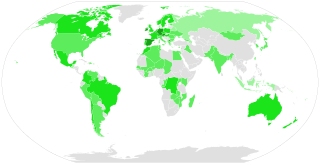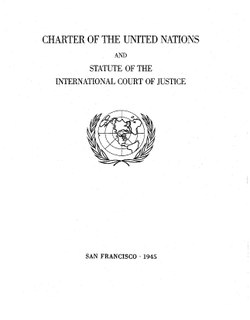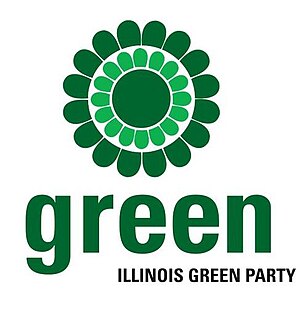
A green party is a formally organized political party based on the principles of green politics, such as social justice, environmentalism and nonviolence.
The Association of State Green Parties was an organization of state Green Parties in the United States between 1996 and 2001. In 2001, it evolved into the Green Party of the United States.

The Charter of the United Nations (UN) is the foundational treaty of the UN, an intergovernmental organization. It establishes the purposes, governing structure, and overall framework of the UN system, including its six principal organs: the Secretariat, the General Assembly, the Security Council, the Economic and Social Council, the International Court of Justice, and the Trusteeship Council.

The Australian Greens, commonly known as The Greens, are a confederation of Green state and territory political parties in Australia. As of the 2019 federal election, the Greens are currently the third largest political party in Australia by vote. The leader of the party is Adam Bandt, and the party's co-deputy leaders are Larissa Waters and Nick McKim.
Green politics, or ecopolitics, is a political ideology that aims to foster an ecologically sustainable society often, but not always, rooted in environmentalism, nonviolence, social justice and grassroots democracy. It began taking shape in the western world in the 1970s; since then Green parties have developed and established themselves in many countries around the globe and have achieved some electoral success.
The Green Party of Canada is a federal political party in Canada, founded in 1983 with a focus on green politics.
The following outline is provided as an overview and topical guide to green politics, a political ideology that aims for the creation of an ecologically sustainable society rooted in environmentalism, social liberalism, and grassroots democracy. It began taking shape in the western world in the 1970s; since then Green parties have developed and established themselves in many countries across the globe, and have achieved some electoral success.

The United Tasmania Group (UTG) is generally acknowledged as the world's first Green party to contest elections. The party was formed on 23 March 1972, during a meeting of the Lake Pedder Action Committee (LPAC) at the Hobart Town Hall in order to field political candidates in the April 1972 state election.
The Earth Charter is an international declaration of fundamental values and principles considered useful by its supporters for building a just, sustainable, and peaceful global society in the 21st century. Created by a global consultation process, and endorsed by organizations representing millions of people, the Charter "seeks to inspire in all peoples a sense of global interdependence and shared responsibility for the well-being of the human family, the greater community of life, and future generations." It calls upon humanity to help create a global partnership at a critical juncture in history. The Earth Charter's ethical vision proposes that environmental protection, human rights, equitable human development, and peace are interdependent and indivisible. The Charter attempts to provide a new framework for thinking about and addressing these issues. The Earth Charter Initiative organization exists to promote the Charter.

The Values Party was a New Zealand political party. It is considered the world's first national-level environmentalist party, pre-dating the use of "Green" as a political label. It was established in May 1972 at Victoria University of Wellington. Its first leader was Tony Brunt, and Geoff Neill, the party's candidate in the Dunedin North electorate, became the Deputy Leader.
Green liberalism, or liberal environmentalism, is liberalism that includes green politics in its ideology. Green liberals are usually liberal on social issues and "green" on economic issues. The term "green liberalism" was coined by political philosopher Marcel Wissenburg in his 1998 book Green Liberalism: The Free and The Green Society. He argues that liberalism must reject the idea of absolute property rights and accept restraints that limit the freedom to abuse nature and natural resources. However, he rejects the control of population growth and any control over the distribution of resources as incompatible with individual liberty, instead favoring supply-side control: more efficient production and curbs on overproduction and overexploitation. This view tends to dominate the movement, although critics say it actually puts individual liberties above sustainability.

The Greens is a green political party in Luxembourg.

Greens Western Australia, commonly known as the Greens WA, is a member party of the Australian Greens in Western Australia. The Greens (WA) was formed following the merger of the Western Australian Green Party with the Green Earth Alliance composed of the Vallentine Peace Group and Alternative Coalition in 1990. The Party became officially affiliated with the Australian Greens in 2003.

The Federation of Green Parties of Africa is an umbrella body of the various national Green parties and environmental parties in Africa. The formal coalition, the African Greens Federation (AGF) formed in 2010 at a conference in Kampala, Uganda. As part of the Global Greens, founded in 2001 in Canberra, Australia, the parties included in the Federation of Green Parties of Africa follow the Global Greens Charter. The organization's permanent administration is in Ouagadougou, the capital of Burkina Faso, where the predominant green organization is the Rassemblement Des Ecologistes du Burkina Faso. These parties tend to, but not always, be left-leaning and often do not have widespread support in their respective countries.

Global Young Greens (GYG) is an emerging global organisation supporting and consolidating the efforts of young people working towards social justice, ecological sustainability, grassroots democracy and peace. GYG is a joint project of over 70 youth organisations and many hundreds of individuals, including the Federation of Young European Greens, Asia Pacific Young Greens Network, Cooperation and Development Network Eastern Europe, Young Volunteers for the Environment and others. GYG is a non-profit organisation under Belgian law.
The Green Party of the United States has its origins dating back to 1984, when 62 people from around the U.S. came to St. Paul, MN to found the first national Green organization - the Committees of Correspondence. Since then, U.S. Greens have gone through several evolutions, from debating theory and praxis in the 1980s, to starting state parties in the 1990s, to the founding of a national political party in the 2000s.

The Illinois Green Party is a statewide political party in Illinois. The party is state affiliate of the Green Party of the United States. Its stated mission and purpose are to advance the Ten Key Values of the Green Party in Illinois through political means and to support individual members and the formation of Green Party locals.
The Défi Vert de Québec (DVQ), literally " Québec's Green Challenge", is a municipal political party in Quebec City, Quebec, Canada.

The Global Greens (GG) is an international network of political parties and movements which work to implement the Global Greens Charter. It consists of various national Green political parties, partner networks, and other organizations associated with green politics.











